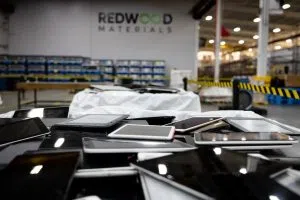
Consumer batterie. (Photo courtesy of Redwood Materials via the North Dakota Monitor)
This story was produced by Grist and co-published with States Newsroom
(Via the North Dakota Monitor) – Rows of dead batteries stretch across some 30 acres of high desert, organized in piles and boxes that are covered to shield them from the western Nevada sun. This vast field is where Redwood Materials stores the batteries it harvests from electric vehicles, laptops, toothbrushes, and the litany of other gadgets powered by lithium-ion technology. They now await recycling at what is the largest such facility in the country.
Redwood was founded in 2017 by former Tesla executive JB Straubel and says it processes about three-quarters of all lithium-ion batteries recycled in the United States. It is among a growing number of operations that shred the packs that power modern life into what is called “black mass,” then recoup upwards of 95% of the lithium, cobalt, nickel, and other minerals they contain. Every ounce they recover is an ounce that doesn’t need to be dug from the ground.
Recycling could significantly reduce the need to extract virgin material, a process that is riddled with human rights and environmental concerns, such as the reliance on open pit mines in developing countries. Even beyond those worries, the Earth contains a finite source of minerals, and skyrocketing demand will squeeze supplies. The world currently extracts about 180,000 metric tons of lithium each year — and demand is expected to hit nearly 10 times that by 2050, as adoption of electric vehicles, battery storage, and other technology needed for a green transition surges. At those levels, there are only enough known reserves to last about 15 years. The projected runway for cobalt is even shorter.
Before hitting these theoretical limits, though, demand for the metals is likely to outstrip the world’s ability to economically and ethically mine them, said Beatrice Browning, an expert on battery recycling at Benchmark Mineral Intelligence, which tracks the industry. “Recycling is going to plug that gap,” she told Grist.




